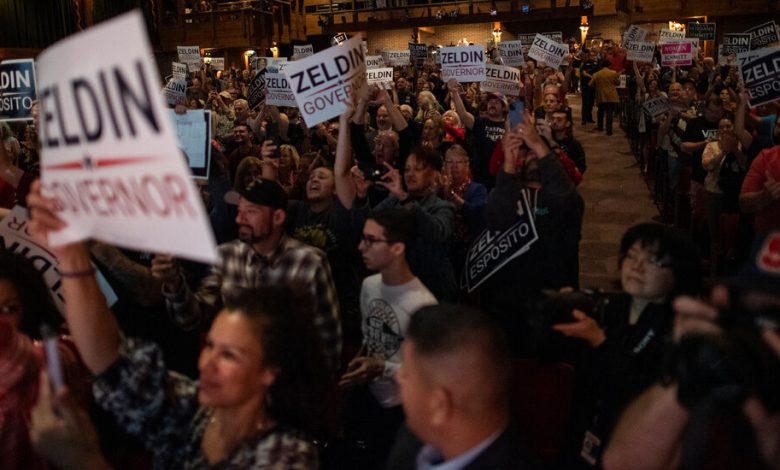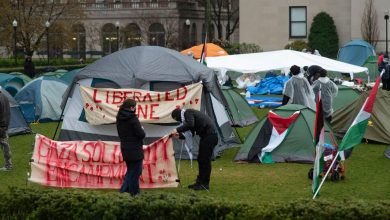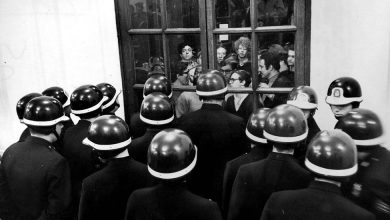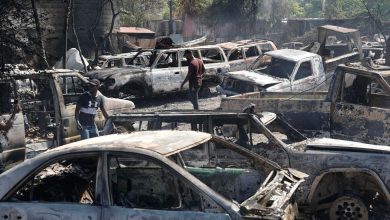Meet the Voters Who Fueled New York’s Seismic Tilt Toward the G.O.P.

GREAT NECK PLAZA, N.Y. — Lynn Frankel still has bouts of nostalgia for her old life, the one before the coronavirus pandemic brought New York City to a standstill and fears about crime began to bubble across this well-to-do suburb. There were dinners in the city with friends, Broadway shows, outings with her children — all an easy train ride away.
But these days if she can help it, Ms. Frankel, 58, does not set foot in the city. She’s seen too many headlines about “a lot of crazy stuff”: flagrant shoplifting, seemingly random acts of violence and hate crimes, which triggered concern about the safety of her daughters, who are Asian American.
Something else has changed, too. Ms. Frankel, a political independent who reviled Donald J. Trump, gladly voted Republican in this month’s midterm elections to endorse the party’s tough-on-crime platform, and punish the “seeming indifference” she ascribes to Democrats like Gov. Kathy Hochul.
“If you don’t feel safe, than it doesn’t matter what all the other issues are,” she said the other day in Great Neck Plaza’s tidy commercial area.
New York and its suburbs may remain among the safest large communities in the country. Yet amid a torrent of doomsday-style advertising and constant media headlines about rising crime and deteriorating public safety, suburban swing voters like Ms. Frankel helped drive a Republican rout that played a decisive role in tipping control of the House.
The attempt to capitalize on upticks in crime may have fallen short for Republicans elsewhere across the nation. But from Long Island to the Lower Hudson Valley, Republicans running predominantly on crime swept five of six suburban congressional seats, including three that President Biden won handily that encompass some of the nation’s most affluent, well-educated commuter towns.
The numbers were stark. New York’s major suburban counties around the city — Nassau, Suffolk, Westchester and Rockland — all shifted between 14 and 20 points to the right, thanks to a surge in Republican turnout and crucial crossover votes from independents and Democrats. Even parts of the city followed the trend, though it remained overwhelmingly blue.
Take the Third Congressional District, a predominately white and Asian American seat connecting northeast Queens with the North Shore of Long Island that flipped to a Republican, George Santos. Turnout data suggests that Republican enthusiasm almost completely erased Democrats’ large voter registration advantage and flipped some voters, helping Lee Zeldin, the Republican nominee for governor, turn a long-shot bid into the state’s closest race for governor in 30 years.
Other factors accounted for Democrats’ suburban struggles here. Threats to abortion access drove some liberal voters to the polls, but many reliably Democratic Black, Latino and white voters stayed home. Swing voters blamed the party for painful increases in gas and grocery bills. Orthodox Jewsfurious over local education issues voted for Republicans at unusually high rates. Tactical decisions by Ms. Hochul appear to have hurt her party, too.
The Aftermath of New York’s Midterms Elections
- Who’s at Fault?: As New York Democrats sought to spread blame for their dismal performance in the elections, a fair share was directed toward Mayor Eric Adams of New York City.
- Hochul’s New Challenges: Gov. Kathy Hochul managed to repel late momentum by Representative Lee Zeldin. Now she must govern over a fractured New York electorate.
- How Maloney Lost: Democrats won tough races across the country. But Sean Patrick Maloney, a party leader and a five-term congressman, lost his Hudson Valley seat. What happened?
- A Weak Link: If Democrats lose the House, they may have New York to blame. Republicans flipped four seats in the state, the most of any state in the country.
But in interviews with strategists from both parties, candidates, and more than three dozen voters across Long Island and Westchester County, it appeared that New York was uniquely primed over the last two years for a suburban revolt over crime and quality of life.
“Elections move dramatically when they become about a singular topic, and the election in New York was not about extremism on the left or right, about abortion or about Kathy Hochul,” said Isaac Goldberg, a Democratic political strategist on the losing side of several marquee races. “The election in New York was about crime.”
Long Island and Rockland County in particular have large populations of active and retired law enforcement, and a history of sensitivity to crime and costs. Growing Asian American and Orthodox Jewish populations were especially motivated this year by a string of high-profile hate crimes.
Then there is the coronavirus pandemic. Arguably no metropolitan area was hit harder than New York, where the economy and old patterns of life have also been slower to return. Remote work remains popular here, leaving Midtown office towers, commuter trains and subways below capacity — and many suburbanites increasingly reliant on media accounts saturated with images and videos of brutal acts of violence to shape their perceptions.
Commuters recently boarding trains into Manhattan from Nassau and Westchester said they were uneasy navigating Pennsylvania Station, some of which has been under construction; unnerved by the apparent proliferation of homeless encampments and open drug usage in Midtown; and now looked over their shoulder on the subway for people who appear to be mentally disturbed.
Several, including Ms. Frankel, said they frequently read The New York Post, which made Mr. Zeldin’s candidacy for governor and the repeal of the state’s 2019 bail law a crusade for more than a year, splashing violent crimes across its front page, however rare they may still be. Many asked not to be identified by their full names out of fear of backlash from friends, colleagues or even strangers who could identify them online.
“I wouldn’t go into the city even if they paid me,” a retired dental hygienist said as she mailed a letter in Oyster Bay. A 41-year-old lawyer from Rockville Centre said she sometimes wondered if she would make it home at night alive. A financial adviser from North Salem in Westchester County said it felt like the worst days of the 1980s and 1990s had returned, despite the fact that crime rates remain a fraction of what they were then.
“I have kids who live in Manhattan, and I am every day scared,” Lisa Greco, an empty nester who voted all Republican, said as she waited at a nail salon in Pleasantville, in Westchester.
“I don’t want them taking the subways but of course they do,” she continued. “I actually track them because I have to know every day that they’re back home. Like, I don’t want to keep texting them like, ‘Are you at work? Are you here?’”
Republicans, led by Mr. Zeldin, a Long Islander himself, relentlessly fanned those fears, blaming Democrats for the small rises in crime while accusing them of coddling criminals. A deluge of conservative advertising only amplified the approach, which blamed the new bail law and a Democratic Party that has complete control over both New York City and Albany.
Crime statistics tell a more complicated story. Incidents of major crimes are higher in New York City and Nassau County than before the pandemic, though they remain well below levels seen in recent decades. In Westchester, Suffolk and Rockland counties, major crime has been flatter, though in the first six months of this year, property and violent crimes were up compared with the same period in 2021.
Ms. Hochul had taken actions as governor to help combat crime and address the mental health crisis among the city’s homeless. And in the race’s final weeks, she pivoted to stress that she would do more. But voters and Democratic officials alike agreed the more nuanced approach was too little, too late.
“She’s not wrong, but it came across to a lot of the people I spoke to on Long Island as dismissive and tone deaf,” said Laura Curran, the former Democratic Nassau County executive who was swept out of office last fall by similar currents. “I don’t think it can be overstated how visceral people on Long Island feel about it.”
Ms. Hochul and other Democratic candidates spent more of the campaign focused on economic issues and protecting abortion rights. But unlike other states, some voters in New York said they were satisfied that abortion was already safely protected under state law.
“The mayor of New York City got elected last year running on this issue. Nothing got better; it got worse,” said Mike Lawler, a Republican who unseated Representative Sean Patrick Maloney in a district that Mr. Biden won by 10 points in Westchester and Rockland Counties. “So I don’t know why any of them are so surprised that this was top of mind to voters.”
Many New York City residents are baffled by what they view as the irrational fear of those in communities that are objectively far safer. But so are some suburbanites.
Back on the South Shore of Long Island, a woman waiting for the Long Island Railroad one morning last week said that since relocating from Brooklyn earlier this year, she had noticed a “hypersensitivity to strangeness” and “hysteria” around crime. It included fliers claiming only Republicans could keep the area safe and a drumbeat of messages in a neighborhood watch group about suspicious looking strangers wandering through well-appointed streets.
“There’s a lot of community fear around this town and Nassau becoming more unsafe or changing,” said the woman, a Black lawyer in her mid-40s who only agreed to be identified by her initials K.V. “Maybe it has to do with a wave of people moving from urban communities since the pandemic.”
Commuting into the city two to three times a week for work from Rockville Centre, she said she felt no less safe than before, recalling stories of people getting pushed onto subway tracks when she was a child. She voted for Democrats to ensure the protection of abortion access.
Other voters who supported Democrats said they did have concerns about increases in crime, but could not justify backing any Republican associated with Mr. Trump and opposed to abortion rights.
“Abortion was definitely the biggest reason I voted Democrat,” said Susie Park, 41, who recently moved to Nassau County from Manhattan. “I don’t feel like a party should ever tell you what you should or should not do.”
At the ballot box, though, they were clearly outnumbered on Long Island this year by voters like Gregory Gatti, a 61-year-old insurance broker.
A political independent, he said he and most of his friends had voted for Republicans “because they want something done” about crime, inflation and illegal immigration.
As he read a fresh New York Post — its front-page headline, “Children of War,” once again devoted to New York City crime — Mr. Gatti said changes to the state’s bail law were “definitely” driving increases in crime, and he was now worried about possible upticks in the suburbs. But he had noted other reasons for concern, as well, as he commutes a couple of days each week through Penn Station to Lower Manhattan.
“I have noticed more homeless encampments. We never used to have those,” he said. “You have encampments, then you have drugs, you have crime.”
Timmy Facciola contributed reporting from Pleasantville, N.Y.




